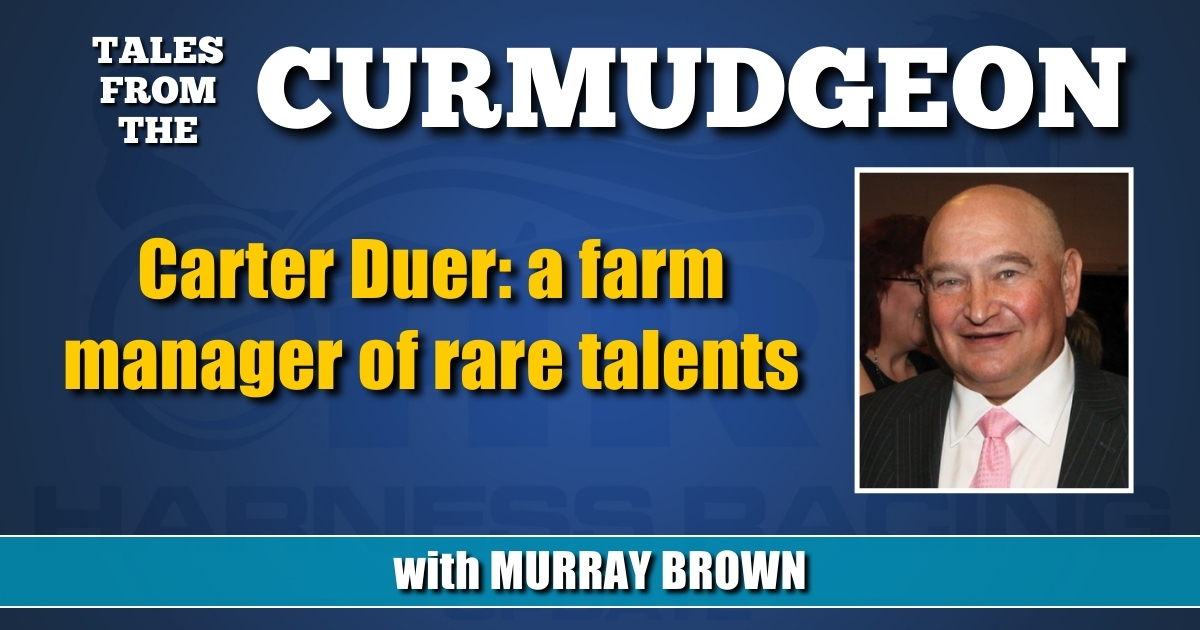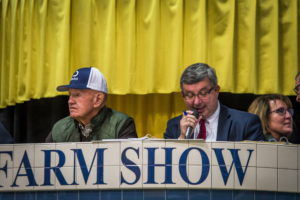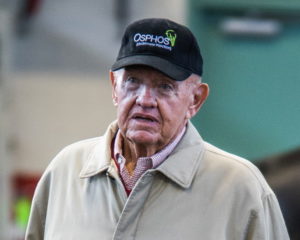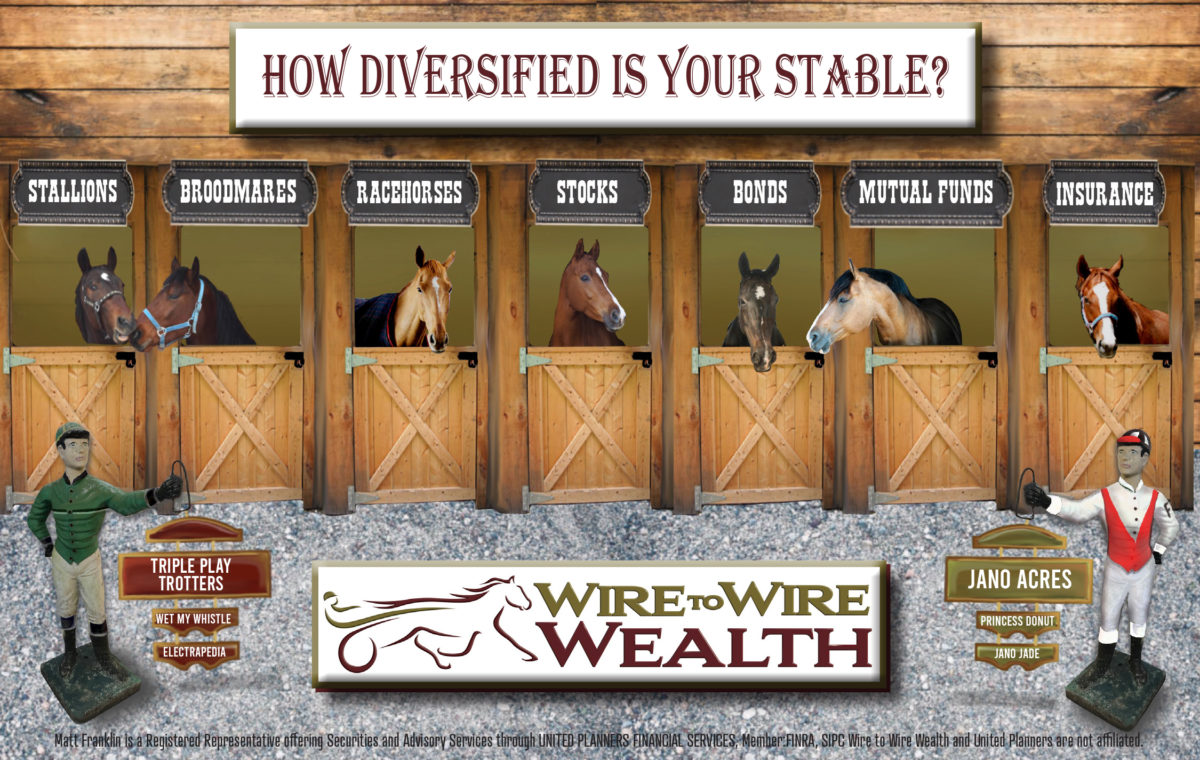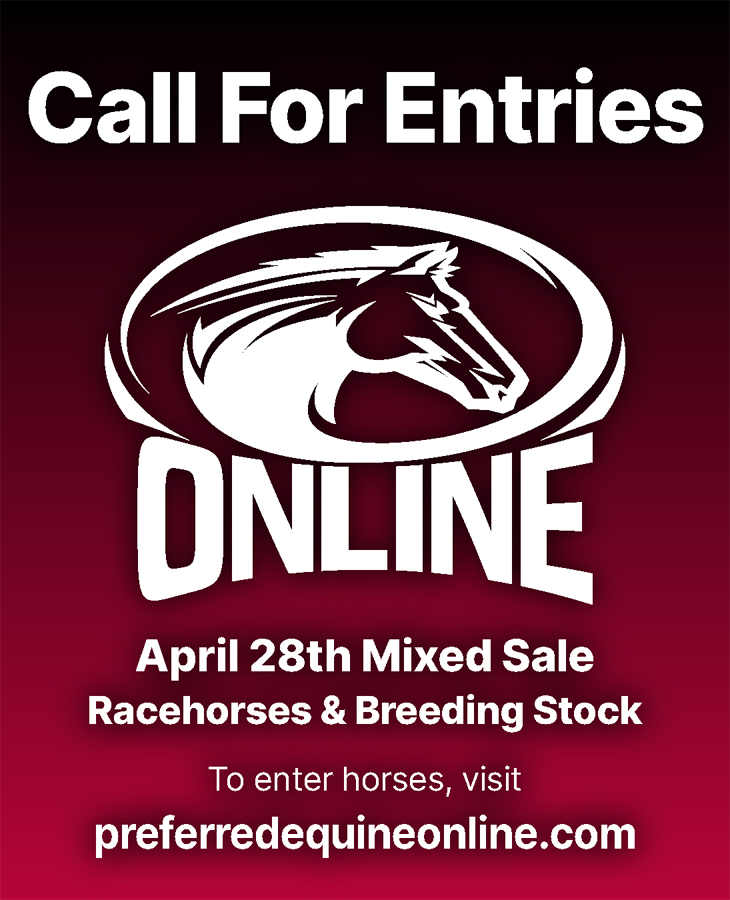Carter Duer: a farm manager of rare talents
The founder of Peninsula Farms is among a very small group of the best farm managers the sport has ever had.
by Murray Brown
There have been and are numerous epic horse farm managers — among them Lawrence “Brownie” Brown at Walnut Hall Farm, Francis McKinzie at Castleton and Almahurst, Ted Woodley at Walnut Hall, Bill Brown at Castleton and Blue Chip, Albert Adams at Almahurst, Drs Bridgette Jablonsky and Peter Boyce at Hanover, Bob Brady at Kentuckiana and probably a few others who I’ve inadvertently left off.
This week’s subject, Carter Duer, not only was and remains a great manager, but he is the only one of those mentioned who not only worked at and managed two divisions of Castleton Farm and was a key component in the establishment of Kentuckiana Farms, but also established a major breeding establishment of his own from the ground up.
Duer was born and raised in the small town of Exmore, VA. For as long as he could remember he wanted to be involved with harness racing, specifically the breeding end of the business.
He quickly realized that the only way to do this successfully was to go to work at an already successful horse farm.
He began, as he terms it, at the end of a pitchfork at world renowned Castleton Farm in 1961.
Prior to that, he spent a summer at Roosevelt Raceway with a few horses that his family owned. He’d go to the paddock every night with either those horses or to help warm up horses for anybody who could use a spare hand. He was occasionally asked to run bets for those such as Eddie Cobb, John Simpson and Del Miller. Many of the horsemen loved to bet, always on their own horses and they entrusted their money with this tall gangly kid from Virginia. At that time, because of the huge crowds it wasn’t all that easy to get one’s money down, but Duer cannot remember ever missing. There were some winners, but there were a good many losers, as well.
When he came to Castleton, world renowned horseman Earl Teater was in charge of the entire operation. Mr. Teater’s field of expertise was with show horses. He and Frances Van Lennep went back a long time.
Bill Brown was in charge of the standardbred division. He was one great teacher. Brown quickly recognized Duer’s work ethic and his desire to learn more and Duer rose through the ranks.
Duer worked under Bill Brown for almost three years and benefitted greatly from his tutelage.
The Van Lenneps had purchased 1,000 acres in Trenton, FL with the intention of building a breeding farm there. They had built and opened Pompano Park and felt that a breeding program in the Sunshine State would be an excellent boost for racing there.
As Duer describes the piece of land, “The land was good enough, but it was right in the middle of nowhere. My job was to build a suitable breeding farm there, commensurate with Mrs. Van Lennep’s taste for having a quality environment for the horses.” They dropped him off and told him they’d be back to see him in four or five days.
It took almost two years, but the chore was accomplished. They sent Race Time down there as the first commercial stallion to stand in Florida. To this very day, he remains Duer’s favorite.
“We started off together and I feel we both did reasonably well,” Duer said.
After a few years in Florida, Bill Brown had decided to accept an offer to become the manager of Blue Chip Farms in New York.
Duer was asked to move back to Kentucky to run the mother ship.
He remained there for 12 years and for whatever reasons decided that he just wasn’t as happy as he felt he should be.
At the same time, Tom Crouch was starting Kentuckiana Farms in Kentucky. “Tom is Tom,” Duer said.
They had good times and a few bad ones.
“One thing with Tom Crouch is that you always knew where you stood. His ambition was boundless. He wanted the best. He also wanted to be the best. Sometimes he was. To this day, we are friends and I’ve even got a couple of mares on the farm for him. Eventually, we decided to go in different directions. While working with Tom I had purchased a piece of land. This piece was to become Peninsula Farms.”
As Duer describes it,”I got very lucky in a short period of time. Three things happened that kept me above water.”
The first occurred shortly after the news got out that he was starting his own enterprise. He received a phone call from his long-time patron and friend John Hayes, Sr.
Always quick to get to the point, “The Senator” as Hayes was known said “I’m flying in to Louisville tomorrow morning. Pick me up.”
Duer did as instructed. One rarely did otherwise when given an order by Hayes.
Hayes wanted to speak to Duer about his future and to propose that he would like to move all the Beejay Stables horses to Duer’s place. Beejay Stables was owned by Hayes and the Shapiro brothers from Montreal. They had an extremely successful racing stable which won two Little Brown Jugs, two Meadowlands Paces and numerous other events. They had gone into breeding. Would Duer like to take these horses? Indeed he would. This would give him the cash flow that he would need to get his new venture going.
The second fortuitous event was when Hanover Shoe Farms were holding a reduction sale of some of their mares that hadn’t produced to expectations. Duer bought the mare Speedy Love for $16,000. “Sixteen thousand, Duer said, I didn’t have sixteen hundred.”
Somehow he managed to come up with the money to pay for his purchase. As luck would have it , the very next year her son Speed Bowl won the 1982 Hambletonian. That enabled him to sell the Super Bowl filly that she was carrying when he bought her for $116,000.
Carter Duer has always been one to reinvest any gains that he made in our business right back into that same business.
That fall, all the horses from Leonard J. Buck’s Allwood Farm, as well as the farm itself, were being sold at the Harrisburg Sale. Mr. Buck had died the previous winter and his will specified that the horses and the farm were to be sold as soon as reasonably practical.
Among the horses was a weanling by the name of Arsenal. His buyer was Carter Duer for the then unheard of price of $70,000.
Duer was out to dinner that evening and he recalls Tom Crouch telling him that the price of $70,000 for a weanling was the craziest price for any horse in the entire history of the sport.
The next fall, Arsenal fetched $230,000 in the Kentuckiana Farms agent yearling consignment to the Kentucky Standardbred Horse Sale. Carter Duer was on his way.
Recently, Duer and yours truly had a long, most enjoyable, conversation where two old guys got to reminisce about the great sport and especially the great people who we were privileged to have known.
Carter, you are one of the very small number of savants I have known who once he saw a horse for the first time knew it forever on sight.
“That used to be true. Unfortunately as I’ve grown old that isn’t the case anymore. There was a time at Castleton where we had well over 100 yearlings out in the fields and I could identify every one of them at first glance. Not only the yearlings, but every mare, every foal or weanling, every single horse on the farm. Not only could I tell you who they were, but I could also tell you a lot about them, their dams, what their dam’s previous foals had looked like, who they were by, who trained them and what they had done on the racetrack and in some cases the same for their grandams. Sadly, those days are somewhat past. I still know a decent number of them, but nowhere near as well as I used to.”
I mentioned above that Race Time was likely your all-time favorite horse. If we were to speak more of current times, who would that honor belong to?
“There’s a 3-year-old trotting colt by the name of Captain Corey that we bred, raised and sold as a yearling for $150,000. He is a drop dead gorgeous horse. I trained his dam. She wasn’t very much. She earned all of $380. My son, John, is friendly with the owner of his sire Googoo Gaagaa and he managed to get us a booking to him. The colt raced seven times last year. I thought that he was the best one out there. He won his first five starts and was extremely impressive in doing so. Then he seemed to tail off a little in his last two starts. His connections wisely decided to put him away. I look for very good things from him this season. Speaking of Googoo Gaagaa, what an amazing sire he appears to be! I’ve been lucky enough to sell two yearlings by him and they brought $150,000 and $110,000, respectively. He is already recognized as one of the great European trotting stallions. With stallions, one never knows where they are going to come from. I find it interesting that coming into this season two of the top contenders for the Hambletonian are Venerate and Captain Corey. They are by Love You and Googoo Gaagaa, two sires who stand in Europe.”
You and I seem to favor trotters over pacers. Who do you see as the leading trotting sires out there?
“Even though there are lots of young, very promising stallions with their foals on the way and also considering the impact of the European horses, the standout to me is still Muscle Hill. Relative to their respective initial opportunities, Chapter Seven has to be in the conversation as well. Muscle Hill is the greatest trotter that I’ve ever seen and he might very well be the greatest trotting sire ever. They all aren’t perfect individuals. Most of them have a right knee that doesn’t sit perfectly.
“I thought that Chapter Seven was a great horse but the fact that he wore trotting hobbles kept me away from him, initially. Like the Muscle Hills, they all aren’t perfect, but when you get a good one it can be very special. Walner was that kind of horse. I know I’m blowing my own horn, but I’ve got a Chapter Seven yearling filly that has to be among the finest yearlings that I’ve ever raised. She comes from the family of Amigo Volo. I think she is very, very special.”
Carter, You’ve been fortunate to be involved with a good many of the great people of the sport, let’s talk about some of them.
Mr. and Mrs. Fred Van Lennep
“They were great people. They had enough confidence in a young kid who was somewhat wet behind the ears to entrust him with doing something he had never done before — building and then running a first class horse farm in an area were that was unknown and then bringing that same person up north to manage one of the greatest horse farms that the world has ever known.”
Bill Brown
“He was a great boss and a great person. I learned a lot from watching and being around him. Here’s something most people don’t know about Bill: when we built and ran the Florida farm, he had enough confidence in my ability to do it right, that he never ever visited the place.”
Earl Teater
“Most harness people probably wouldn’t even know the name. But he was the person in charge of all Mrs. Van Lennep’s equine holdings. His specialty was show horses and he was considered one of the best ever in that field. Ultimately, those in the harness racing division were responsible to him. But so long as he felt we were doing a good job, he let us be.”
Ralph Baldwin
“He would certainly be in the running for the greatest horseman I’ve ever known. He never had a very large stable, but he developed numerous champions from those horses that he trained. He was a very kind and patient man. He made good horses out of some that didn’t have the credentials to be good.”
Billy Haughton
“Probably the greatest horseman and most unique human being that I’ve ever known. How he managed to do all that he managed to was beyond my understanding. He always looked for the best in either a horse or a person. His glass was never half empty. I used to be intrigued watching him train his youngsters on “mutt days”. The 2-year-olds that were doing alright were trained on a Monday-Thursday or Tuesday-Friday routine. The ones trained on Wednesday-Saturday were those that needed help — thus Mutt Days. Those were the days when Billy gave his undivided attention to those that needed it most. He almost never gave up on a horse and many good ones were graduates of Mutt Days. He was very thorough.
“We used to pick him up at DuQuoin or one of the other places on the Western swing to give him a first-hand look at the yearling crop. We’d have dinner and he stayed at my place. Then he’d look at the yearlings the morning before we flew him back. One year, he looked at all 135 yearlings we had in. I said, ‘That’s all of them, Bill.’ He said, ‘There’s one more that I didn’t see.’ ‘Oh, that one,’ I said. ‘You don’t want to look at him. He’s a mess. He got hurt and he’s all beat up.’ Billy said that we should look at him anyway. Not only did he look at him, but he bought him. His name was Jilley and he ended up being a solid A pacer in New York.”
George Sholty
“A dear friend and a great horseman. He developed many good horses. At his best, he could drive with anyone, anywhere, anytime. Here’s a Sholty story: I was training a horse myself. It was the last year that Louisville Downs was open. I asked George if he would drive her for me. He agreed. It was a horrible rainy night. George won. We went to the winner’s circle, even though we all got soaked. Not only was it on the last night that Louisville Downs was open, but it was also the last time that George drove in a race.
“Here’s another story about George: He had more or less evolved from a full-time horseman to a part-time horseman and farmer. One night, a truck pulling a trailer pulls into the farm. George gets out. ‘I’ve got something to show you,’ he said. He opens the trailer and walks out with a huge bull that he had purchased. He was proud of the bull and wanted me to see it.”
Speaking of drivers and horsemen, how would you compare those of today with those of generations ago?
“I would say that we have far more great drivers today and far fewer great trainers. There are certainly some very good trainers out there. But they’ve got a much better horse to deal with. They are so much easier to get gaited and get balanced. I believe that insofar as individuals are concerned, there are very few really bad ones at the sales, even the regional sales.”
Bill Weaver
“One of a kind. One of the greatest, kindest and most considerate people to ever inhabit this planet.”
John Hayes, Sr.
“Another one of a kind, but in a totally different manner than Bill Weaver. There was no middle ground with ‘The Senator.’ He was very opinionated. His opinions were usually on the mark. He was one of the leading proponents of allowing shipped semen for registration. He was a gambler in most senses of the word — whether it was with horses, on horses or on cards. If you could show him that his opinion was wrong you might be able get him to change it, but you’d have to work very hard to get the job done.”
Jules and Arlene Siegel
“Two very wonderful people. They have been long-time customers and clients. They bought our yearlings, we boarded their horses, sold horses as agent for them. Above all, they have been great friends for a good length of time.”
Dave McDuffee
“I don’t know anybody who enjoys the sport more. From breeding and raising a few of his own, to going to the sales and shopping for yearlings, to watching his horses train, keeping tabs with his trainers and above all watching his horses race. I don’t know many who enjoy having a good horse more than him. Perhaps most importantly, he is a great guy.”
Irving and Herb Liverman
“Two extremely intelligent men. They’ve been extremely loyal to me through the years. The constant success they’ve enjoyed is not an accident.”
How has COVID-19 affected you?
“I’m among the very few people with whom I’ve been in contact that hasn’t got it. Just about all my family, as well as all the people on the farm, have had it. I guess I’m just one of the lucky ones.”
Where does Peninsula Farm and Carter Duer stand in harness racing today?
“I would say that we are kind of winding down. I’ve sold two thirds of our land to Rood and Riddle. They are using it as one huge reproduction center for all breeds of horses. We still have some good clients like Dave McDuffee, Mel Hartman, Herb Liverman, John Floren (Coyote Wynd Farms) and a few Amish breeders. Speaking of the Amish, they have been and continue to be a force to be reckoned with in the sport. Where they used to play mostly in the lower end of the market, they are now very active at the top. I have one client who wants to build a quality broodmare band. He has three mares booked to Gimpanzee this year.”
Have a question or comment for The Curmudgeon?
Reach him by email at: hofmurray@aol.com.







